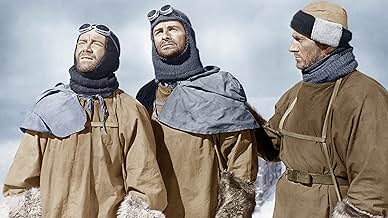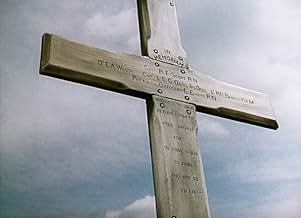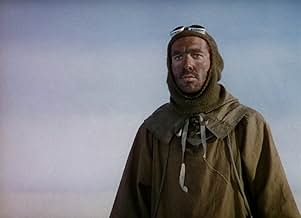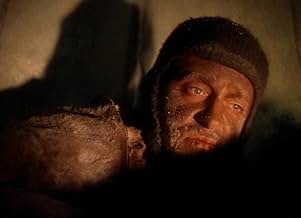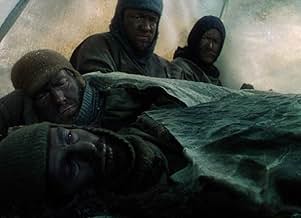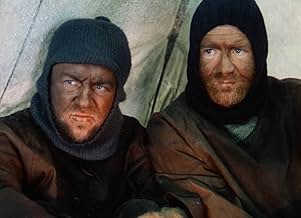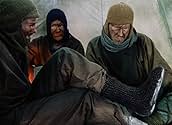L'Aventure sans retour - L'Odyssée du capitaine Scott
Titre original : Scott of the Antarctic
- 1948
- Tous publics
- 1h 51min
NOTE IMDb
7,0/10
2,7 k
MA NOTE
Ajouter une intrigue dans votre langueThe story of British explorer Robert Falcon Scott's 1912 expedition and his quest to be the first to reach the South Pole.The story of British explorer Robert Falcon Scott's 1912 expedition and his quest to be the first to reach the South Pole.The story of British explorer Robert Falcon Scott's 1912 expedition and his quest to be the first to reach the South Pole.
- Réalisation
- Scénario
- Casting principal
- Nomination aux 1 BAFTA Award
- 1 victoire et 2 nominations au total
James McKechnie
- Surgeon Lt. E.L.Atkinson R.N.
- (as James Mc Kechnie)
Avis à la une
This was a terrific film. I first saw this movie in the summer in Atlanta when it was near 100 degrees and our air cond was not blowing very cold. Scenes in this film actually made me feel cold. I felt as though I had been on a journey to The South pole after this one. The final 45 minutes of this film are a gripping adventure, and does it without todays special effects.
Scott of the Antarctic is a flawed but compelling and beautifully made film, that is definitely worth seeing. The pacing is rather pedestrian in places, the film does sort of idealise the character of Robert Falcon Scott and there is one or two meanderings in the story. Flaws aside, the special effects are absolutely incredible, even for back then, the cinematography is very skillful, the scenery is splendid and the score is resolutely haunting. Also very well done is the focused direction and the compelling performances of John Mills, James Robertson Justice, Diana Churchill and Kenneth More. And there are excellent values portrayed throughout, achievement, triumph, friendship and endeavour, consequently the film's ending is quite moving to say the least. All in all, it isn't perfect but it is worth seeing for the acting and the effects. 7/10 Bethany Cox
There have recently been a lot of dramatised and documentary programmes on UK terrestrial and satellite TV on the pioneering polar explorers, erstwhile rivals and colleagues Scott & Shackleton so I was keen to view this British made dramatisation of the former's doomed 1912 expedition to the South Pole. I was not disappointed. It is obviously difficult to maintain cinematic excitement for the viewer of what is basically a long march (a similar problem as in "The Spirit of St Louis" and "The Old Man & the Sea"), but the true to life tragedy here proves compelling in the end. Jack Cardiff's colour photography is splendid and I was surprised to observe so few "process" shots for a film from the 1940s, given the scale of the task here. John Mills is excellent in the key role of Commander Scott but the supports are all excellent, many of them chosen for their physical similarity to their real life counterparts - Mills too bears a more than passing likeness of physiognomy to Scott. In the post - war climate, Britain obviously sought comfort and inspiration from past heroes as the country rebuilt itself in economic austerity and Scott must have been an ideal model for glorification. Regardless of sniping comments from historians about Scott's poor planning, the film quite rightly avoids judgements and asks the viewer to recognise and admire the human heroism of these gallant men. There is surely no more tragic sacrifice in all exploration than Oates' "I'm going outside, I may be gone some time" - exit and the movie captures this moment with the necessary pathos, later repeating the sensitivity as Scott and his last two colleagues expire with the so near and yet so far "11 miles" on their freezing lips. The Vaughan-Williams music is suitably sweeping and elegiac. One wonders why Hollywood ignored the film at the Academy Awards of 1948, certainly the acting, cinematography and music, to name but three, were worthy of recognition. I wonder if anyone would remake it in the modern era as we approach the centenary of the triumph and tragedy of Scott's expedition. Are you listening Peter Jackson...?
The Ealing Studios production `Scott of the Antarctic' is a work of art and an inspiration to human achievement. The film depicts the polar explorers of the Second Scott Antarctic Expedition (1910-1913). They are portrayed first as pygmies against the terrible backdrop of the ice continent, then as dauntless giants within the enclosed spaces of their fragile tents as they await their certain death.
The mood of the film is High Victorian, although strictly speaking the setting is Late Edwardian. Edward Adrian Wilson, the artist, played by Harold Warrender, is the quintessential gentleman naturalist. As the film begins, Wilson is shown in the summery garden of his tranquil country homestead in England, meticulously creating a scientific illustration of a mounted bat. At the end, when Wilson is among the few remaining explorers who face frozen death in their wind-whipped tent, his spirit drifts away to his English home.
The Victorian faith in mechanisms is brought forth by close up shots of distance-measuring wheels that are attached to the backs of clumsy man-drawn sledges, and by the heroic but flawed powered tractors that break down in the awful cold.
The film invites the viewer to arrive at his or her own conclusions about the character of Captain Scott. The film makes no judgments - it merely portrays Scott through the superb acting of John Mills.
`Scott of the Antarctic' is a timeless film about eternal values: human endeavor, achievement and triumph.
The mood of the film is High Victorian, although strictly speaking the setting is Late Edwardian. Edward Adrian Wilson, the artist, played by Harold Warrender, is the quintessential gentleman naturalist. As the film begins, Wilson is shown in the summery garden of his tranquil country homestead in England, meticulously creating a scientific illustration of a mounted bat. At the end, when Wilson is among the few remaining explorers who face frozen death in their wind-whipped tent, his spirit drifts away to his English home.
The Victorian faith in mechanisms is brought forth by close up shots of distance-measuring wheels that are attached to the backs of clumsy man-drawn sledges, and by the heroic but flawed powered tractors that break down in the awful cold.
The film invites the viewer to arrive at his or her own conclusions about the character of Captain Scott. The film makes no judgments - it merely portrays Scott through the superb acting of John Mills.
`Scott of the Antarctic' is a timeless film about eternal values: human endeavor, achievement and triumph.
The story of British explorer Robert Falcon Scott'CVO (6 June 1868 - c. 29 March 1912) , masterfully played by John Mills , and his 1912 expedition and his quest to be the first to reach the South Pole . It is magnificently adapted by means of a splendid cinematography, adequate make up , impressive exteriors and formidable effects . Dealing with his worried wife (Diana Churchil) and how Robert Scott enlists a motley and highy-prepared group (James Robertson Justice , Christopher Lee ,Kenneth More , John Gregson , Derek Bond , Clive Morton ,among others) to carry out the risked travel . But a rival team of Norwegian explorers led by Amundsen conspire against him.
The true story of how a hero attempts to be the first man to discover the South Pole, only to find that the murderously cold weather and far North Pole spoil their ill-fated expedition . To add to the authenticity of this near-documentary/drama movie , it had a lot of the Antarctic scenes that were filmed in Graham Land, Antarctica, , furthermore : Norway, Jungfrau, Kanton Bern, Switzerland , Falmouth Docks, Falmouth, Cornwall, England. Although there was about various weeks to get worthwhile filming locations , the vast majority of this picture was actually shot on studio , in Ealing Studios, Ealing, London. Breathtaking and overwhelming cinematography by three best cameramen of the British cinema : Osmond Borradaile , Jack Cardiff and Geoffrey Unsworth . Adding an impressive and rousing musical score by Vaughan Williams . The motion picture was compellingly directed by Charles Frend . Charles made his directorial debut in 1942 and turned out several low-budget dramas and documentaries. After the war he directed several critically acclaimed dramas, including Cruel Sea (1953) and Scott of the Antarctic (1948) at his best . His final film as director was The Sky-Bike (1967) and the film on which he ended his career was Ryan's daughter (1970), on which he worked as a second-unit .
Adding more biographic remarks , the deeds happened in the following way : Robert Falcon Scott was a Royal Navy officer and explorer who led two expeditions to the Antarctic regions: the Discovery expedition of 1901-1904 and the ill-fated Terra Nova expedition of 1910-1913. On the first expedition, he set a new southern record by marching to latitude 82°S and discovered the Antarctic Plateau, on which the South Pole is located. On the second venture, Scott led a party of five which reached the South Pole on 17 January 1912, less than five weeks after Amundsen's South Pole expedition. The temperatures recorded by Scott and his team on remain to this day some of the lowest ever recorded. A planned meeting with supporting dog teams from the base camp failed, despite Scott's written instructions, and at a distance of 162 miles (261 km) from their base camp at Hut Point and approximately 20 km from the next depot, Scott and his companions died. When Scott and his party's bodies were discovered, they had in their possession the first Antarctic fossils ever discovered. The fossils were determined to be from the Glossopteris tree and proved that Antarctica was once forested and joined to other continents. Before his appointment to lead the Discovery expedition, Scott had followed the career of a naval officer in the Royal Navy. In 1899, he had a chance encounter with Sir Clements Markham, the president of the Royal Geographical Society, and thus learned of a planned Antarctic expedition, which he soon volunteered to lead . Having taken this step, his name became inseparably associated with the Antarctic, the field of work to which he remained committed during the final 12 years of his life. Following the news of his death, Scott became a celebrated hero, a status reflected by memorials erected across the UK. However, in the last decades of the 20th century, questions were raised about his competence and character. Commentators in the 21st century have regarded Scott more positively after assessing the temperature drop below , 40 °C in March 1912, and after re-discovering Scott's written orders of October 1911, in which he had instructed the dog teams to meet and assist him on the return trip that was flop . Scott is presumed to have died on 29 March 1912, or possibly one day later. The positions of the bodies in the tent when it was discovered eight months later suggested that Scott was the last of the three to die. The bodies of Scott and his companions were discovered by a search party on 12 November 1912 and their records retrieved. Tryggve Gran, who was part of the search party, described the scene as, "snowcovered til up above the door, with Scott in the middle, half out of his bagg ... the frost had made the skin yellow & transparent & I've never seen anything worse in my life". Their final camp became their tomb; the tent roof was lowered over the bodies and a high cairn of snow was erected over it, topped by a roughly fashioned cross, erected using Gran's skis . As an Observation Hill memorial cross, was erected in 1913 and Captain Scott's log and many of the personal effects of the explorers were loaned by The British Museum . Rating 7.5/10 . Better than average .
The true story of how a hero attempts to be the first man to discover the South Pole, only to find that the murderously cold weather and far North Pole spoil their ill-fated expedition . To add to the authenticity of this near-documentary/drama movie , it had a lot of the Antarctic scenes that were filmed in Graham Land, Antarctica, , furthermore : Norway, Jungfrau, Kanton Bern, Switzerland , Falmouth Docks, Falmouth, Cornwall, England. Although there was about various weeks to get worthwhile filming locations , the vast majority of this picture was actually shot on studio , in Ealing Studios, Ealing, London. Breathtaking and overwhelming cinematography by three best cameramen of the British cinema : Osmond Borradaile , Jack Cardiff and Geoffrey Unsworth . Adding an impressive and rousing musical score by Vaughan Williams . The motion picture was compellingly directed by Charles Frend . Charles made his directorial debut in 1942 and turned out several low-budget dramas and documentaries. After the war he directed several critically acclaimed dramas, including Cruel Sea (1953) and Scott of the Antarctic (1948) at his best . His final film as director was The Sky-Bike (1967) and the film on which he ended his career was Ryan's daughter (1970), on which he worked as a second-unit .
Adding more biographic remarks , the deeds happened in the following way : Robert Falcon Scott was a Royal Navy officer and explorer who led two expeditions to the Antarctic regions: the Discovery expedition of 1901-1904 and the ill-fated Terra Nova expedition of 1910-1913. On the first expedition, he set a new southern record by marching to latitude 82°S and discovered the Antarctic Plateau, on which the South Pole is located. On the second venture, Scott led a party of five which reached the South Pole on 17 January 1912, less than five weeks after Amundsen's South Pole expedition. The temperatures recorded by Scott and his team on remain to this day some of the lowest ever recorded. A planned meeting with supporting dog teams from the base camp failed, despite Scott's written instructions, and at a distance of 162 miles (261 km) from their base camp at Hut Point and approximately 20 km from the next depot, Scott and his companions died. When Scott and his party's bodies were discovered, they had in their possession the first Antarctic fossils ever discovered. The fossils were determined to be from the Glossopteris tree and proved that Antarctica was once forested and joined to other continents. Before his appointment to lead the Discovery expedition, Scott had followed the career of a naval officer in the Royal Navy. In 1899, he had a chance encounter with Sir Clements Markham, the president of the Royal Geographical Society, and thus learned of a planned Antarctic expedition, which he soon volunteered to lead . Having taken this step, his name became inseparably associated with the Antarctic, the field of work to which he remained committed during the final 12 years of his life. Following the news of his death, Scott became a celebrated hero, a status reflected by memorials erected across the UK. However, in the last decades of the 20th century, questions were raised about his competence and character. Commentators in the 21st century have regarded Scott more positively after assessing the temperature drop below , 40 °C in March 1912, and after re-discovering Scott's written orders of October 1911, in which he had instructed the dog teams to meet and assist him on the return trip that was flop . Scott is presumed to have died on 29 March 1912, or possibly one day later. The positions of the bodies in the tent when it was discovered eight months later suggested that Scott was the last of the three to die. The bodies of Scott and his companions were discovered by a search party on 12 November 1912 and their records retrieved. Tryggve Gran, who was part of the search party, described the scene as, "snowcovered til up above the door, with Scott in the middle, half out of his bagg ... the frost had made the skin yellow & transparent & I've never seen anything worse in my life". Their final camp became their tomb; the tent roof was lowered over the bodies and a high cairn of snow was erected over it, topped by a roughly fashioned cross, erected using Gran's skis . As an Observation Hill memorial cross, was erected in 1913 and Captain Scott's log and many of the personal effects of the explorers were loaned by The British Museum . Rating 7.5/10 . Better than average .
Le saviez-vous
- AnecdotesCaptain Scott's log and many of the personal effects of the explorers were loaned by The British Museum to add to the authenticity of this near-documentary.
- GaffesNo one's breath is ever visible in the Antarctic.
- Citations
Capt. L.E.G. Oates: I'm just going outside; I may be away some time.
[as he leaves tent for certain death]
- Crédits fousRalph Vaughan Williams, then revered as Britain's greatest living composer, has an official credit consisting only of his surname, 'Vaughan Williams'.
- ConnexionsFeatured in Antarctica (1991)
- Bandes originalesWill Ye No Come Back Again?
(uncredited)
Traditional Scottish tune, and lyrics by Lady Carolina Nairne (as Carolina Oliphant, Lady Nairne)
Heard as the ship leaves New Zealand
Meilleurs choix
Connectez-vous pour évaluer et suivre la liste de favoris afin de recevoir des recommandations personnalisées
- How long is Scott of the Antarctic?Alimenté par Alexa
Détails
Box-office
- Budget
- 2 370 000 £GB (estimé)
- Durée
- 1h 51min(111 min)
- Rapport de forme
- 1.37 : 1
Contribuer à cette page
Suggérer une modification ou ajouter du contenu manquant

